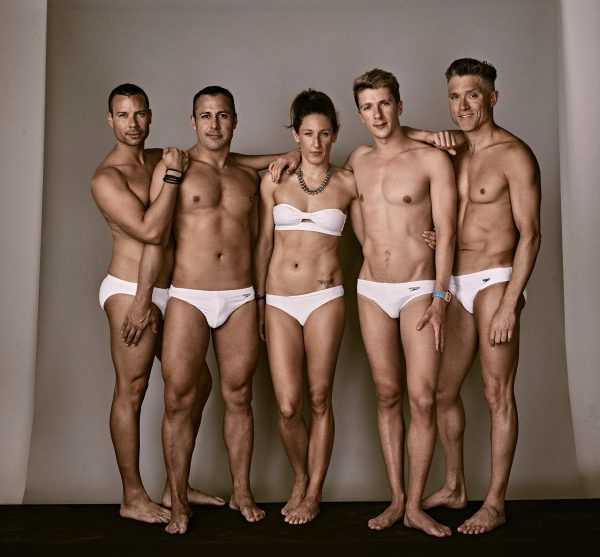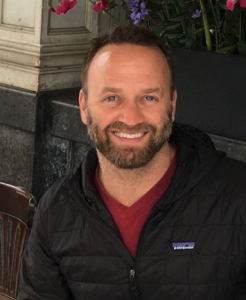
After competing last week in the International Gay and Lesbian Aquatics Championships held in Edmonton, Canada, the West Hollywood Aquatics swim team returned to California on Monday as champions. The roster of 24 members racked up the most points by placing in the top 10 in the most races, winning the Large Team Championship against teams from 10 countries.

James T. Ballard, a member since the team’s founding in 1982, former president of its board of directors, and former world-record holder for the 100-meter backstroke for his age group, was not surprised by the victory. “We usually do fairly well. We have some amazing people on our team,” he said, adding that as a team with members of varying skill levels, some strategy is required when choosing teams for the races. “There are always some unexpected successes. In our relays in particular, we blend the faster swimmers with the swimmers who are not as likely to earn a medal.”
While swimming may not have the team dynamics that make a sport thrilling to spectators, there are challenges and rewards unique to team competitive swimming. When flinging themselves between the dull roar underwater and the cacophonous cheers and whistles above the surface, the swimmer works both in solitude and in rivalry. “You’re isolated,” said member Nathan Santell. “It’s energizing and exhilarating and difficult, but also relaxing at the same time.” In addition to the physical benefits of the low-impact workouts, Weho Aquatics members give each other another benefit: community. Santell, a member since 2009, credits his involvement with the team with making him feel at home in Los Angeles.
““Everyone is just really warm and respectful and I think that everyone holds each other to high standards . . . I expected it to be kind of superficial and catty. I also had some internalized homophobia and didn’t want to be associated with a gay team,” he said. With a 34-year legacy of multiple championships and as gold medalist at the 2014 Gay Games in Cleveland, Weho Aquatics has succeeded because of its supportive atmosphere and focus on health and camaraderie.

“We must have done something right along the way because it’s still going 30 some years later,” said Ballard, adding that the club’s water polo team consists of mostly younger members who he hopes will carry on the club’s proud legacy. Two of those younger members are currently planning to show the world how the club grew from a community project to major competitor in U.S. Masters Swimming. Santell and fellow member and documentarian Lis Bartlett have begun the process of seeking funding to create a feature-length documentary about the team’s positive role in modern gay culture. The sizzle reel for “Light in the Water: The Story of the West Hollywood Aquatics Swim Team” features interviews with members and has an emotional, inspirational tone.
The team faced adversity in the ’80s and ’90s both in and out of the water. According to Ballard, the team was disallowed entry to the Eleanor G. Roberts Aquatic Center due to a bigoted pool manager and was banned from another pool due to paranoia about the transmission of AIDS. At U.S. Masters Swimming meets, the competition could be less than friendly. “I remember going to the blocks and the guys next to us say, ‘that’s the fag team, there’s all the queers’. And I turned to the four people on my relay team and said, ‘we are going to crush them’,” said Ballard in Santell’s test footage for “Light in the Water.”
Partly inspired by athlete and activist Tom Waddell and the creation of the Gay Olympics, later renamed the Gay Games after a lawsuit by the United States Olympic Committee, and partly by a simple desire to compete in an atmosphere where one could be openly gay, West Hollywood Aquatics thrived under head coach Mark Webster Chatfield, an Olympic gold medalist. Chatfield was not openly gay during his athletic career and commented in 1994 that coming out may have damaged his career. According to OutSports, a website dedicated to LGBT athletes, a record 49 LGBTI athletes in the 2016 Rio Olympics are open about their non-cis identities. During the 2012 Summer Olympics in London, there were 23.
In 1982, the AIDS epidemic had not yet fully surfaced, was not fully understood by the gay community or the world at large, and was creating death and heartache. Ballard estimates that the club lost as many as 40 members between’82 and the mid ’90s to AIDS and AIDS-related illnesses.
“It was a chaotic period,” said Ballard. “We were losing members and losing friends and for a lot of people, (being a member) was how they found their way in the community.”
WeHo Aquatics is hosting “Jox on the Lot,” a fundraiser, from 2 to 7 p.m. this coming Sunday at Faultline bar, 4216 Melrose Ave. in Los Angeles. Admission is $5. More information is available on Facebook. Also, donations can be made to the film project online.
